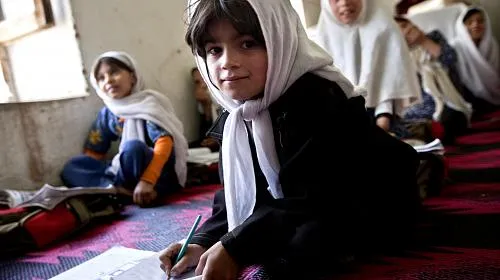As Girl Summit commences in London, CARE details plan to turn tide against child marriage in parts of Nepal and Bangladesh, help communities reach a “Tipping Point” of lasting change
LONDON — The world can end child marriage in a generation, according to CARE experts addressing the Girl Summit in London today, but only if those vowing to stop the practice truly tackle the underlying forces driving girls and boys into child marriage across the globe.
Enacting policies to prevent child marriage and developing programs to educate and empower girls are critical steps, said Doris Bartel, a Girl Summit delegate and CARE’s director of gender and empowerment. But they’re far from enough. “Real progress requires deep changes from within entire families and communities, from parents and in-laws to religious leaders and business owners,” Bartel said. “Only then will the forces giving young girls greater choices win out over those pushing them into early marriage.”
Co-sponsored by UNICEF and the UK government, the Girl Summit is designed to draw firm commitments from a wide movement — faith leaders and development organizations to national governments and community groups — to end child marriage. Nearly 39,000 girls become child brides every day. That’s about one every 2 seconds and enough girl brides to fill Fenway Park, where the Boston Red Sox play — every single day. “That is a staggering, unacceptable number,” said Helene D. Gayle, president and CEO of CARE USA. “Child marriage doesn’t just rob young girls and boys of their childhood — it undermines future progress in health, education and development for entire nations. It’s time to take real, tangible steps to address the root causes of child marriage so children can thrive and reach their true potential.”
CARE’s delegation has signed the Girl Summit charter and pledged, through its Tipping Point initiative, to help communities in parts of Bangladesh and Nepal reverse the tide against child marriage. With a US $6.6 million investment over the next three years, CARE will advocate against child marriage globally and strike at the roots of the problem in 90 villages of northeastern Bangladesh — where 66 percent of girls marry before they are 18 — and 16 subdistricts of southern Nepal — where 41 percent of girls become child brides.
At the summit, CARE is urging governments and donors to intensify their own efforts to cut at the roots of child marriage by promoting secondary school education for girls, access to safe reproductive health services for adolescents and economic opportunities for teenage girls. CARE also is calling for: greater efforts to empower already-married girls who are often invisible in society; national strategies that make governments accountable for reducing child marriage; and increased support for community-led initiatives that transform social norms underpinning the practice.
Engaging men and boys is particularly critical to shifting those social norms, said Sabitra Dhakal, who heads up the Tipping Point in Nepal. “The father who makes most family decisions, the married boy who brings a wife to his house after wedding and the male religious leader who creates pressure to uphold traditional thinking — all are key to shifting gender dynamics in these communities.” At the summit, Dhakal also is providing a snapshot of an oft-overlooked aspect of child marriage: child grooms. In many cases they too lack choices about whom to marry and are forced to drop out of school.
The Tipping Point builds on CARE’s experience addressing child marriage in more than a dozen countries. From the Middle East and South Asia to sub-Saharan Africa, CARE helps communities generate their own solutions. In Ethiopia, where CARE helped adolescent brides through improvement in education, health, business and financial literacy, attitudes about girls began to change and communities stopped at least 180 child marriages. Another innovative project in Nepal delayed the marriage of 220 girls by providing them with educational support and obtaining their parents’ guarantee that the girls would finish high school. The program also engaged the media, religious leaders and law enforcement to change perceptions about the practice, even securing a commitment from caterers that they would refuse their services for child marriage ceremonies.
Media Interviews:
To arrange a media interview with one of CARE’s child marriage experts, including those at the Girl Summit, please contact: Nicole Harris (Atlanta), nharris@care.org, 404-735-0871; Brian Feagans (Atlanta), bfeagans@care.org, (404)-457-4644; or Laura Gilmour (London) at Gilmour@careinternational.org, +44 207 091 6063, +44 777 996 4644
About CARE:
Founded in 1945 with the creation of the CARE Package®, CARE is a leading humanitarian organization fighting global poverty. CARE places special focus on working alongside poor girls and women because, equipped with the proper resources, they have the power to lift whole families and entire communities out of poverty. Last year CARE worked in 87 countries and reached more than 97 million people around the world. To learn more, visit www.care.org.

